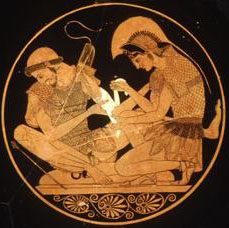![[Loyola University Chicago]](http://www.luc.edu/images/loyola.gif)
CLST 272-001: Heroes and Classical Epics

![[Loyola University Chicago]](http://www.luc.edu/images/loyola.gif)
|
CLST 272-001: Heroes and Classical Epics |

|
 Strategy:
think of specific passages that illustrate important points, so you
can back up your arguments with concrete evidence on the test. Be sure
you explain clearly how the passage helps demonstrate your point. Strategy:
think of specific passages that illustrate important points, so you
can back up your arguments with concrete evidence on the test. Be sure
you explain clearly how the passage helps demonstrate your point.
|
| Loyola Homepage | Classical Studies Department | Find Loyolans | Loyola Site Index |

Revised 23 October 2015 by
jlong1@luc.edu
http://www.luc.edu/classicalstudies/